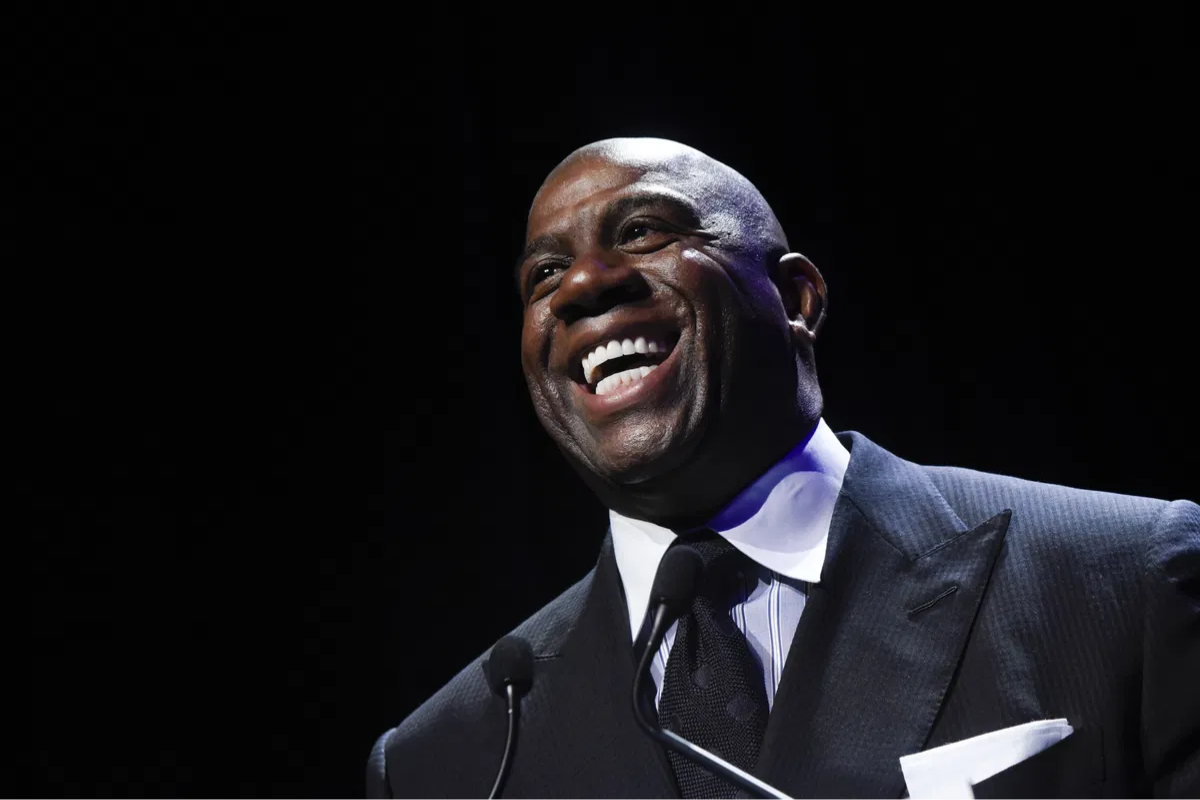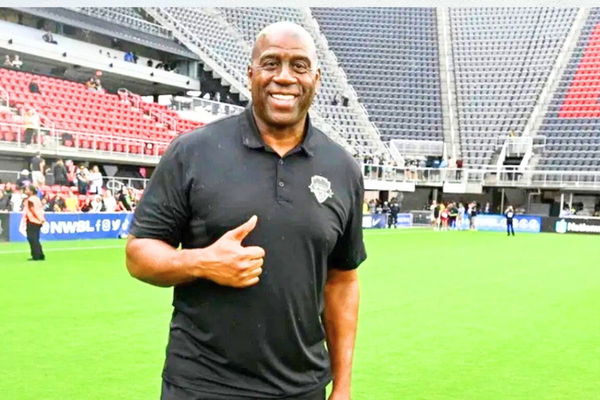



Magic Johnson wasn’t just dribbling past defenders in his early days. Long before the NBA lights found him, a teenage Magic was pushing brooms in a seven-story office building in Lansing, Michigan. But that wasn’t just a summer job. It was his first peek into the world of business.
Watch What’s Trending Now!
“I would go clean the first six floors, but on the seventh floor, that’s where the CEO’s office was, so I would bust in and I would pretend like I was the CEO, and I would put my feet up on the desk,” he said back in 2013 during Advancing the Dream: Live from the Apollo. That last line? Hits deep—“I grew up poor, but I didn’t have poor dreams.”
Now, years later, he’s living every bit of that dream. After making his name on the hardwood, Magic took that same fire to the boardroom. But he’s always kept it real. “We got to still understand that we got to understand money, build wealth and pass this on to our kids,” he told the Apollo crowd. “…go into the community… own our business and then put our people to work.”
Now while, people learning his basketball journey thanks to Winning Time and They Call Me Magic. But with a net worth comfortably sitting in the ten-figure range—yeah, it’s still winning time for Magic.
Magic Johnson’s Net Worth in 2025
It’s not just the basketball legacy that put Magic Johnson in the $1.5 billion club, according to Forbes. His real fortune came after the buzzer. As Forbes points out, a big chunk of his wealth today actually comes from EquiTrust, a life insurance company based in Iowa—not quite the glamorous route, but massively lucrative.

Imago
National Action Network 2023 Convention Day 2 Earvin Magic Johnson participates in chat with mayor Eric Adams and Al Sharpton at NAN 2023 convention day 2 at Sheraton Times Square. National Action Network holds an annual conference inviting elected official, civil rights leaders and public to speak and participate in conversations about civil and human rights in the USA. New York New York United States Copyright: LevxRadin
Even back in his playing days, Magic was already thinking ahead. In 1981, he signed a wild 25-year, $25 million extension with the Lakers. At the time, CNN called it the longest and richest deal in sports. It was structured more like a long-term investment than a typical player contract. Later on, Sports Illustrated noted that he kept adjusting deals to keep his earnings competitive even when he wasn’t the league’s top-paid star.
But here’s where things really took off—Magic Johnson Enterprises. He started the company in 1987 using his NBA money, and it quickly became a heavyweight in underserved communities. As Crunchbase described it, the firm focused on “strategic alliances, investments, consulting and endorsements,” with a mission to uplift diverse areas. By 2020, Fox Business reported the firm had racked up an estimated $1 billion in holdings.
“We’re finally starting to understand (generational wealth)” he told The Guardian. And with that kind of vision? He’s not just building wealth—he’s building legacies.
Magic Johnson’s Business Empire
It all started with coffee—and a movie night. Back in 1998, Johnson cut a game-changing deal with Starbucks to open locations in underserved neighborhoods. “What really stamped me as a serious businessman,” he called it on Kneading Dough, as reported by CNBC. But the pitch wasn’t a boring boardroom meeting. Instead, he took Starbucks CEO Howard Schultz to the opening night of Waiting to Exhale. “Howard grabs me about 20 minutes in and says, ‘Earvin, I never had a movie-going experience quite like this,’” Magic shared.

Getty
TODAY — Pictured: Magic Johnson on Tuesday, April 4, 2023 — (Photo by: Nathan Congleton/NBC via Getty Images)
From there, things took off. The 50/50 partnership—Urban Coffee Opportunities—grew to include 125 stores. And while the financials stayed under wraps, Johnson made it clear the impact was bigger than just profits. “It showed everyone that I could drive ROI in urban America,” he said. His strategy? Tap into the spending power of underserved communities—$1 trillion from African Americans and another trillion from Latinos—and bring retailers to places they’d long ignored.
But Magic didn’t stop at coffee. Through Magic Johnson Enterprises, he’s backed gyms, movie theaters, and even cable TV. And in 2020, Fox Business noted that he had controlling stakes in Aspire TV and EquiTrust.
Interestingly though, not all his business moves were slam dunks. In 1979, Nike offered him stock instead of cash. He chose Converse instead. “That probably cost me a billion dollars,” he once said. Still, it’s hard to argue with the empire he built anyway.
Ownership game
Ownership has been a big part of Magic Johnson’s life. After a short coaching run with the LA Lakers in the ’93-94 season, he made it clear what he really wanted. “I want to go home. It’s never been my dream to coach. I want to own, to be a businessman. You’ve got to chase your dreams,” he told the Associated Press. By June 1994, he’d done just that—buying a 4.5% stake in the Lakers for a reported $10 million.
But the move didn’t last forever. In 2010, he sold his share to longtime Lakers season-ticket holder Dr. Patrick Soon-Shiong. Even then, Magic made sure fans knew where his heart stood. “This was a bittersweet business decision… I am and will always be a Laker for life,” he said, as quoted by Bleacher Report.

Still, Magic wasn’t done with ownership. In 2014, he joined an investment group to buy the WNBA’s Los Angeles Sparks. Fun fact? He’d been a fan since Day 1—literally. According to Forbes, he even attended their very first game back in 1997.
Then came the heavy hitters. In 2012, Magic and his partners made headlines with a record-setting $2.15 billion purchase of the Dodgers—he reportedly chipped in $50 million himself. And by 2014, he added LAFC to his growing sports empire.
So, from courtside to ownership suite, Magic’s playbook just keeps evolving.

